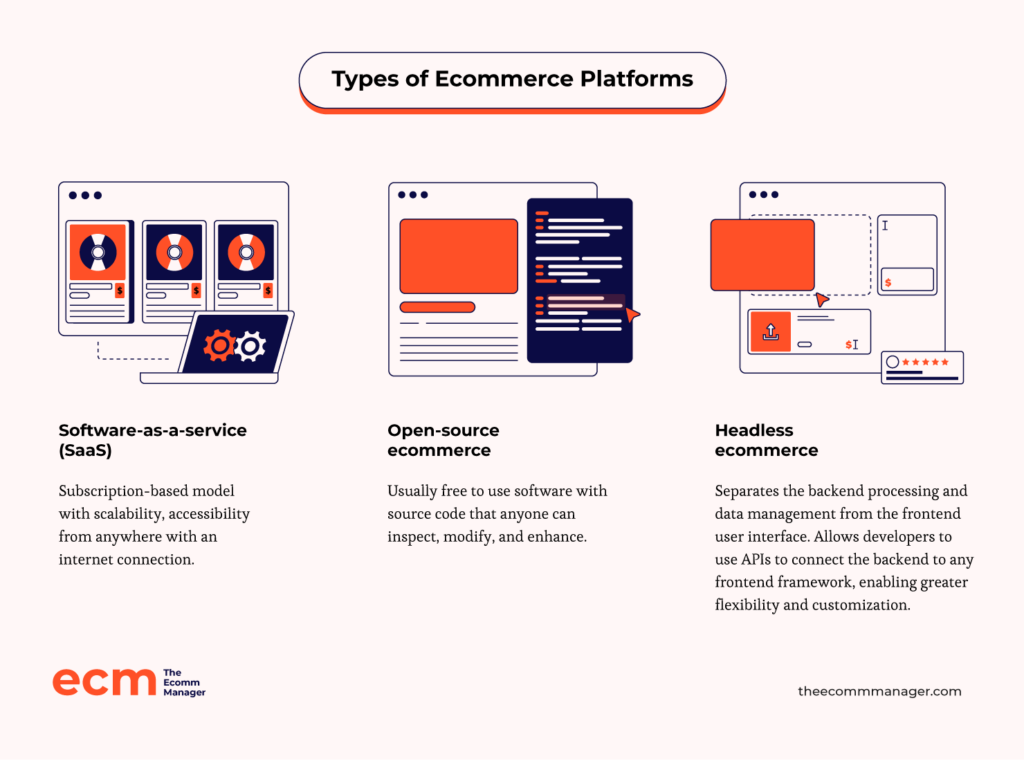Quick summary: An ecommerce platform is software that enables purchasing and selling over the internet.
Ecommerce platforms allow sellers to manage virtual assets, digital sales, service automation, and marketing in one central platform. There are multiple types of ecommerce platform solutions, and each type has unique benefits and advantages.
To get the most out of your ecommerce platform of choice, you are going to want to narrow down two things: 1) what type of ecommerce do you work with, and 2) what type of platform do you need? Keep reading to learn more about each question to ensure you understand what ecommerce platform is best for your online business.
Types of Ecommerce
An ecommerce site can be broadly classified based on their functionality, the type of transactions they facilitate, and the users they are designed for. Here's an overview of the various types of ecommerce platforms:
Business-to-Consumer (B2C) Platforms
These platforms facilitate transactions between businesses and individual consumers. They are the most common type of ecommerce platform, featuring online retailers selling products or services directly to consumers. Examples include Amazon, Walmart.com, and other retail ecommerce websites.
Business-to-Business (B2B) Platforms
B2B platforms are used for transactions between businesses. They enable businesses to buy and sell goods or services in bulk from other businesses. These platforms often feature specialized functionalities to accommodate the complex needs of business transactions, such as bulk pricing, order fulfillment, and invoicing. Examples include Alibaba, ThomasNet, and TradeIndia.
Consumer-to-Consumer (C2C) Platforms
C2C platforms facilitate transactions between individual consumers. These platforms allow individuals to sell, buy, and exchange goods or services with each other. They typically operate as marketplaces where users can list items for sale. eBay, Craigslist, and Etsy (for handmade or vintage items) are examples of C2C platforms.
Consumer-to-Business (C2B) Platforms
In a C2B model, individuals offer products or services to businesses. This can include freelance work, crowdsourced projects, or marketplaces where businesses can solicit contributions or products from the public. Examples include platforms like Upwork and Fiverr, where businesses can hire freelancers for various tasks.

Types Of Platforms
The purpose of an ecommerce platform is to enable you to have a fully functioning online store where customers can purchase your products and services. There are a few different types of ecommerce platforms out there:
Software as a Service (SaaS) Ecommerce Platforms
These are cloud-based platforms that businesses can subscribe to on a monthly or yearly basis instead of hosting their own ecommerce systems. SaaS platforms are user-friendly, scalable, and often come with a range of features and integrations. Shopify, Magento (Adobe Commerce Cloud), and BigCommerce are notable examples.
Open Source Ecommerce Platforms
Open source platforms are freely available for businesses to download, modify, and host on their own servers. They offer high levels of customization and control but require more technical expertise to set up and maintain. Examples include WooCommerce (for WordPress), Magento Open Source, and PrestaShop.
Headless Ecommerce Platforms
A headless ecommerce platform separates the front-end presentation layer from the back-end data management. This allows for greater optimization in how content is displayed across various devices. Developers can use APIs to deliver a customized shopping experience on any interface.
BONUS: Specialty Ecommerce Platforms
There are some cases where you need something very new or novel when it comes to defining what ecommerce platform is best for your storefront. Here are some examples:
Social Commerce Platforms
While not traditional ecommerce platforms, social media platforms have increasingly integrated ecommerce features, allowing businesses and individuals to sell directly through social media profiles and posts. Instagram Shopping and Facebook Marketplace are examples where users can browse and purchase products directly within the platforms.
Mobile Commerce Platforms
These are ecommerce platforms specifically designed for mobile devices, offering apps or mobile-friendly websites to cater to the growing number of users who shop on their smartphones and tablets.
Small Business Ecommerce Platforms
A small business ecommerce platform is a digital solution tailored for the needs and scale of small enterprises. It enables them to sell products or services online with ease and efficiency. Features often include website hosting, shopping cart functionality, and payment processing.
Each type of ecommerce platform caters to different market needs and user behaviors, offering a variety of features and functionalities to support online commerce activities.
What To Consider When Choosing Your Ecommerce Platform?
The first thing to consider is whether an ecommerce platform has all the features that will help you successfully run your business. Some key things to look out for include the following:
- Is it compatible with your website’s design and layout? If not, does a website builder like Squarespace have an option that will work?
- What kind of technical know-how is required to get everything up and running smoothly? Do they prioritize ease of use?
- Can you easily find answers to your questions?
- How often do they update their hosted platform with new features and capabilities?
- Does it work with popular plugins for accounting software, marketing software, and the likes? Which ones?
- What is the pricing and payment options and do they fit your current budget? (Monthly, yearly, per user, free trial, etc.)
- What kind of website templates do they offer? Are they free or paid? Are they easy to customize? Do you like the aesthetic and usability for your customers and brand?
The next thing business owners need to consider is whether the ecommerce marketplace has an active online community. That way, if something goes wrong, there are likely tons of other people out there who’ve experienced the same issues and have found a hosted solution.
The third thing to think about is how scalable your ecommerce website will be as you grow your online store. Some platforms are more suited to small electronic commerce businesses, while others can easily scale with an ever-growing business!
Finally, you need to consider what kind of support is included with your ecommerce software. Some ecommerce platforms offer 24-hour support as part of their package, while others require you to rely on online tutorials for help or pay extra if you have any issues.
11 Important Features Of Ecommerce Platforms
An ecommerce platform typically offers a range of features to support online selling and buying processes. Here are some key features to look for:
1. Product Management
- Ability to add, edit, and manage product listings, including descriptions, images, and prices.
- Options for categorizing and organizing products for easier navigation.
2. Shopping Cart and Checkout
- A secure, intuitive shopping cart system.
- Smooth checkout process with multiple payment gateway integrations (e.g., credit card, PayPal, digital wallets).
3. Payment Processing
- Secure processing of payments with support for various payment methods.
- Features for handling taxes, shipping rates, and currency conversions.
4. Order Management
- Tools for tracking orders, managing inventory, and updating order status.
- Facilitates returns, refunds, and exchanges.
5. Customer Management
- Ability to create customer profiles, including order history and preferences.
- Features for customer segmentation and personalized marketing.
6. SEO and Marketing Tools
- SEO features to improve visibility in search engine results.
- Marketing tools like email campaigns, discount codes, and loyalty programs.
7. Mobile Compatibility
- Responsive design or mobile app to ensure accessibility on smartphones and tablets.
8. Security Features
- SSL certification for secure transactions.
- Data protection measures to safeguard customer information.
9. Analytics and Reporting
- Dashboards and reporting tools to track ecommerce sales, customer behavior, and site performance.
10. Integration Capabilities
- Integration with third-party services like shipping carriers, payment gateways, and social media platforms.
- APIs for custom integration and extension of platform capabilities.
11. Customer Support and Services
- Support options including tutorials, forums, live chat, and customer service lines.
- Knowledge bases and documentation for self-service support.
Selecting the right ecommerce platform involves considering which features are most important for your specific business needs and customer expectations.
Cost & Pricing of Ecommerce Platforms
When exploring ecommerce platforms for your business, understanding the variety of plan options, pricing structures, and add-ons is crucial to finding the best fit for your needs. Ecommerce platforms typically offer a range of plans to accommodate businesses of all sizes, from startups to large enterprises.
Plan Comparison Table for Ecommerce Platform
| Plan Type | Average Price | Common Features Included |
|---|---|---|
| Startup/Basic | $20 - $30 per month | - Basic website hosting - Product listing limits - Basic support - Standard payment processing fees |
| Professional | $80 - $300 per month | - Unlimited products - Advanced analytics - Improved customer support options - Lower transaction fees |
| Enterprise | $300 - $2000+ per month | - Custom domain - Full customization capabilities - Priority support - Advanced security features |
| Free | $0 | - Limited product listings - Basic features - Higher transaction fees - Community-based support |
In conclusion, the choice of an e-commerce platform plan should align with your business size, growth expectations, and specific needs. Consider starting with a basic plan for cost-effectiveness, with the option for scalability as your business grows.
Learn more: Essential Ecommerce Platform Features
Frequently Asked Questions
Here are a few questions I wanted to cover before signing off.
What types of ecommerce platforms are recommended for small businesses?
There are many ecommerce platforms for small businesses, including Shopify, BigCommerce, and WooCommerce.
Shopify is user-friendly and provides a turnkey online store solution right off the bat, with no back-end HTML coding skills required whatsoever. If you choose to use this for your ecommerce transactions, be sure to pair it with Amazon Marketing Services to grow your business.
Next is BigCommerce. While this platform doesn’t offer quite as many marketing features, it’s still a great ecommerce solution and worth considering if you’re on the hunt for an affordable option for your online shop.
WooCommerce also falls into the affordable category but offers a lot more customization options. If you’re looking for something unique and tailored to your specific business needs (like a SaaS platform), then this might be just what you’ve been searching for.
What types of ecommerce platforms are recommended for large businesses?
Large businesses have a lot more options available to them when it comes to enterprise ecommerce platforms. However, the same few still stand out.
Magento Enterprise offers all the features you could ever need as an enterprise-level company, ranging from marketing strategies and analytics to security and support. If your business is looking to grow and sustain this growth, choosing Magento as a platform provider is a smart choice.
Next up is BigCommerce Enterprise, which falls under the same price range as Magento but offers fewer features. However, if you’re just starting out small or already have an established ecommerce business that’s growing quickly, then it might be the better choice for you.
Finally, Shopify Plus is like BigCommerce in terms of features but comes at a much higher cost point due to its enterprise-level ecommerce support and availability. This ecommerce solution is recommended if your business has outgrown boutique or small online business needs.
What types of ecommerce platforms are best for businesses interested in improving their customer experience?
If your company is focused on improving your customer ecommerce experience, you’ll need to choose a customer experience (CX) platform that allows you to customize just about everything you want in real-time. This way, you can truly tailor your online store to every customer.
You’ll also need an ecommerce platform that works on tablets, smartphones (via a mobile app), desktop computers, etc. The higher your ecommerce functionality, the happier everyone will be.
Lastly, the best ecommerce platforms work seamlessly with your email marketing, your marketing tools, and your social media channels, specifically Facebook and Instagram. You’ll want to make sure you can sync these two together to advertise on each of them at the same time. This way, you’ll stay ahead of all the competition.
Remember that most customers have more than one social media account, which means social media is where they’ll likely go first when seeking a solution to a problem.
What factors drive trends in ecommerce platform features?
As time goes on, new ecommerce platforms are developed, and current ones advance in their features. This is due to the market demands for certain things to be improved or added to these online store systems.
How do you determine which ecommerce features your business needs?
This is tough because you don’t want to invest in features that won’t benefit your ecommerce business model, especially when they can cost money.
You can try working with a free ecommerce platform to see if it’s something you like and want to use before spending time and money learning how to set up an online store on a paid one.
Finally, it might be helpful for your business to invest in what your competitors are using so you know exactly where you need to be and how you can get ahead of them. This way, your online store is the one everyone will want to buy from.
Need expert help selecting the right eCommerce Solutions Software?
If you’re struggling to choose the right software, let us help you. Just share your needs in the form below and you’ll get free access to our dedicated software advisors who match and connect you with the best vendors for your needs.
The Takeaway
Your ecommerce platform is a key decision along the way to creating your ecommerce store. With platform types available for businesses of all shapes and sizes, you're sure to find the option that's right for your needs. Take your time when deciding what you need. This can prevent having to worry about replatforming later.
Don't forget to subscribe to The Ecomm Manager newsletter to get the latest expert advice for your ecommerce business.



